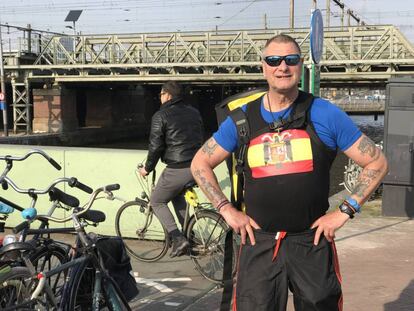A shrine to a Spanish dictator in Amsterdam
Grandson of Dutchman who fought in Spain’s Civil War keeps kitsch collection of Franco memorabilia

In a city as tolerant and permissive as Amsterdam, it is shocking to find this sign outside the entrance to an exhibition: “Strictly off limits to Reds.” But cross the threshold, and the reason becomes clear.

Henk de Groot, the grandson of a Dutchman who fought in the Spanish Civil War (1936-1939), has turned his apartment in the bohemian district of Jordaan into a museum to the greater glory of Spanish dictator Francisco Franco. It might be 2017 out there, and this might be the most liberal city in the world, but inside this bachelor’s pad, it is 1936 and the air smells of a coup.
The items on display at this free exhibition lack any real market value, regardless of how proud of them his owner, a former employee with Dutch flag carrier KLM, may be. They are souvenirs that can be easily purchased at roadside trucker stops in Spain, next to cassette tapes of obscure third-rate singers. Rather than a museum, Henk’s display feels more like a foreign branch of the archetypal Spanish no-frills bar, filled with kitsch memorabilia featuring the yoke and arrows of the Falange, the only legal political party under Franco.
I am retired and I have nothing better to do
The most interesting part of Henk’s museum is the man himself. He acts as a guide, and offers beer and snacks when the tour is over. He explains that his grandfather, Henrik de Groot, was a Catholic sailor from Delfzijl, in the north of The Netherlands. In 1937 he joined the Irish brigade that fought alongside the Nationalists to defend the Church: “My grandfather could not stand the violence against nuns and priests. There was a lot of red terror in Spain.”
His two favorite words in Spanish are rojo (red) and pajarraco (a humorous term for a big, ugly bird). People he dislikes, those who make his life difficult, are pajarracos. Those who think differently are broadly described as rojos. Often, when he runs into someone wearing a Che Guevara shirt, both concepts converge: Henk knows that he is in the presence of a rojo pajarraco.
Henk is 67, and he was a boxer as a young man. Up close, he does not look like someone you would want to get into an argument with. But he often gets into trouble as he rides his bicycle in downtown Amsterdam, wearing a tee-shirt with the Francoist eagle to honor his grandfather’s memory. Passing Spaniards, feeling offended, scream out: “You fucking fascist!” But he does not even bother to look at where the insults are coming from. He just raises his arm and calls out the Francoist salute: “Arriba España.”

This scene typically plays out two or three times a week in front of a crowd that is largely unaware of the reasons for the dispute.
Another time, he says he was surrounded by “seven or eight Catalan women, no doubt separatists,” and that he had to run from them before things got dangerous. Henk says he is “a very tolerant” person who respects other people’s ideas, but who also wants his own ideas to be respected, no matter how contradictory it may sound. He is a widower, and “unfortunately” his children are left-wing.
His apartment contains what looks like over 1,000 photographs, flags, books, towels, lighters, bedsheets and other memorabilia depicting Franco’s face. It is not like people are lining up at the door to come see his collection, but Henk says he gets around 20 visitors a week and hopes to make a greater impact in future.
Henk was once surrounded by “seven or eight Catalan women, no doubt separatists,” and had to make a run for it
“I am retired and I have nothing better to do,” he notes. Time is on his side.
Henk and a few other Dutch colleagues spend their summers in the Spanish beach resort of Torremolinos, but there has been a setback: the new manager of the building where he rents his holiday apartment does not like the fact that Henk is glorifying such a dark period in Spain’s history. Henk snaps out: “She is a pajarraca roja.”
English version by Susana Urra.
Tu suscripción se está usando en otro dispositivo
¿Quieres añadir otro usuario a tu suscripción?
Si continúas leyendo en este dispositivo, no se podrá leer en el otro.
FlechaTu suscripción se está usando en otro dispositivo y solo puedes acceder a EL PAÍS desde un dispositivo a la vez.
Si quieres compartir tu cuenta, cambia tu suscripción a la modalidad Premium, así podrás añadir otro usuario. Cada uno accederá con su propia cuenta de email, lo que os permitirá personalizar vuestra experiencia en EL PAÍS.
¿Tienes una suscripción de empresa? Accede aquí para contratar más cuentas.
En el caso de no saber quién está usando tu cuenta, te recomendamos cambiar tu contraseña aquí.
Si decides continuar compartiendo tu cuenta, este mensaje se mostrará en tu dispositivo y en el de la otra persona que está usando tu cuenta de forma indefinida, afectando a tu experiencia de lectura. Puedes consultar aquí los términos y condiciones de la suscripción digital.








































